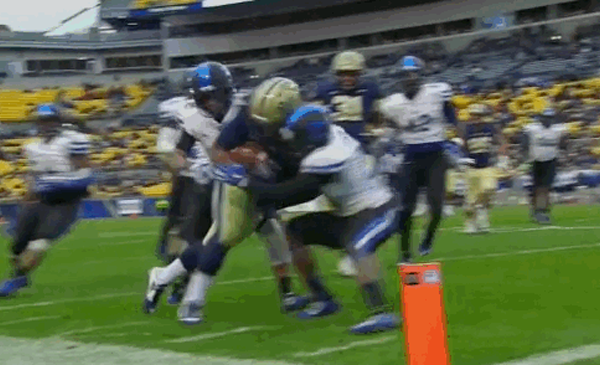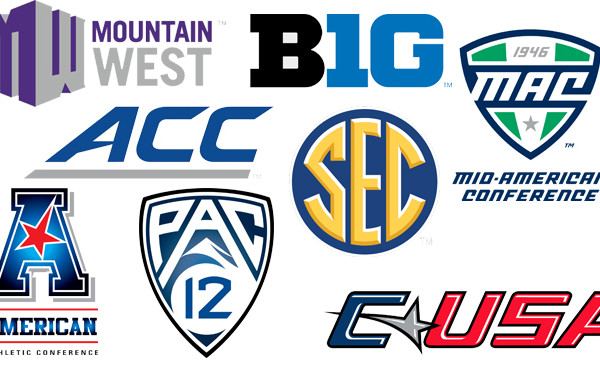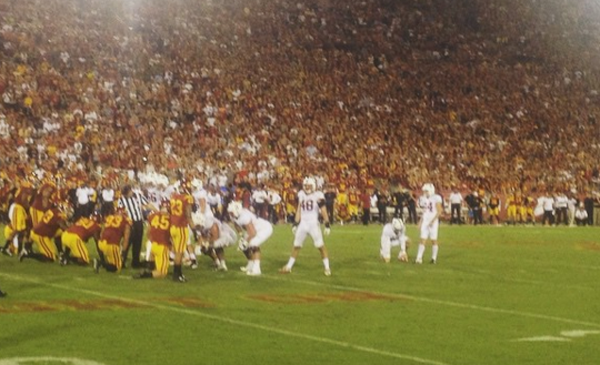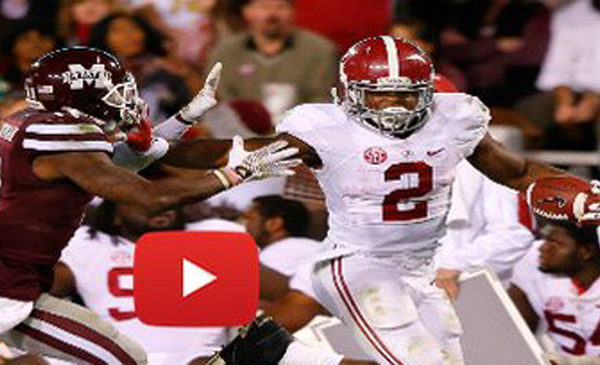Urban Meyer announced Monday Ohio State quarterback J.T. Barrett will forfeit financial aid for a term as a result of a misdemeanor DUI, issued early Oct. 31, the Saturday of the Buckeyes’ bye week.
Meyer further stated that Braxton Miller will be the team’s backup quarterback during Barrett’s suspension, but that Barrett will remain a captain of the team.
Additionally, Barrett will have the opportunity to earn back the term of financial aid — revealed to be the summer term, so it is conceivable that this never comes to pass -all of which makes this announcement by Ohio State and Meyer all the more curious.
At the end of the day, it feels like Meyer’s announcement was doomed from the start.
While this will undoubtedly be filed into the hot-take category, the intent of this piece is anything but fire and brimstone. A series of genuine thoughts occurred to me that, when logically followed down the rabbit hole, led to some other thoughts.
This subject inspired thought, that was the intent behind it, and that’s the only reason I am writing them out. Maybe I cannot dissuade those who would label this a hot-take, but it was definitely borne out of thought more than reaction.
In order to understand why this was a doomed announcement from the outset, it’s first important to look at the different possibilities of what could occur as a result of Barrett’s withheld financial aid and treat them with reason and logic.
In other words, it’s okay to play a game of “…it would logically follow that,” but it’s important that it be done with integrity and the purpose of seeking higher academic understanding.
That’s really what I’m trying to do here and if you have questions following this piece, then I’ve successfully completed my part of the group project.
It’s also important to be fair to Urban Meyer.
Back in 2012, Meyer issued a similar statement and punishment when he suspended Jake Stoneburner and Jack Mewhort for similar behavior. Both men had the opportunity to earn back their scholarship.
At that time, Mewhort and Stoneburner were enrolled in summer classes and ended up paying their own way. Both graduated and played frequently in 2012. Barrett wasn’t on the receiving end of an unprecedented punishment for his situation.
Where this punishment veers off course with me is that it is tantamount to a school being in chief control over whether or not a student should have to pay them tuition money — or any kind of money, for that matter — as a means to enforce a punishment. In Barrett’s case, was an off-the-field incident worth the price of a semester’s tuition and should that be an option to a school trying to teach a young man a lesson?
Driving under the influence is unacceptable. What Barrett did was wrong, and he’d likely be the first to admit that without reservation or hesitation.
When Barrett arrived at Meyer’s house to confront the situation head-on later that day, Meyer said that all of Barrett’s focus was on accepting responsibility and shifting the focus back to Ohio State. Teammate and fellow captain Taylor Decker called Barrett “selfless,” via ElevenWarriors.com.
I do not know J.T. Barrett, but there’s a very genuine feel to his character and this was certainly a deviation from the decision-making and leadership Barrett had shown in the past. Hopefully he understands the severity of what occurred and is able to correct the behavior moving forward.
Whether or not Barrett earns back the scholarship also has an effect on this situation. If he earns it back through Meyer’s “in-house process,” the punishment will effectively have been a one-game suspension (for now) and some time spent in the doghouse.
If Barrett fails to somehow earn back the scholarship, it would be curious to see how other schools approach their recruitment of Buckeye targets. The B1G was the first conference to guarantee its athletes four-year scholarships and it accounted for things like this in its guarantee, but conference’s associate commissioner for compliance Chad Hawley used the term “general sense” when asked about how schools would go about enforcing the punitive side of the legislation.
While most of the media conversation at that time focused on the medical and playing time aspects, the “general sense” quote also applied to community behavior, under which this would definitely fall.
While it’s pointless to pick apart a nebulous concept like “general sense,” it’s not unfair to point out that Barrett seems to have been a model citizen at Ohio State leading up to this incident.
While Barrett and championship-winning QB Cardale Jones battled for the starter spot in the fall, time and time again the media would mention Barrett’s leadership as a reason he would make a better starter.
Eleven Warriors, a well-known and reputable independent Buckeye publication, made a pretty for Barrett prior to the start of the season. Leadership and selfless behavior were at the heart of their case. Then as in now, Barrett appears to be the same man.
So, would it be fair to conclude in a general sense that Barrett is still an upstanding member of the team, school, and community, albeit one who made a mistake?
Forcing or strongly suggesting an athlete to pay for a semester of schooling for a single behavioral violation creates a very slippery slope.
Most coaches want to handle the process of earning a suspended scholarship back in-house, but the flip side of that argument is that the university acts as judge, jury, and executioner — and does so insisting that it’s best the public not meddle in these affairs.
Allowing college football programs and university athletic departments to operate thusly in the past has produced questionable results — and that’s probably being too generous.
The other end of that possibility is that the student-athlete earns back his/her trust and suspended financial aid, while never actually seeing anything more than a game suspension and some time (maybe) in the coaching doghouse.
In this instance, you’re left with a very public display of bravado that included a message to potential recruits that they could literally have to pay money to stay in school if they make a mistake, even if it’s just for a semester.
Some students cannot afford “just a semester” and they would find themselves behind both academically and on the field as a result of not participating in team activities while not enrolled.
Some coaches will use this tool responsibly. Other coaches have likely already used it for dubious reasons.
Opposing fans and haters of Ohio State might argue that this is just Meyer’s way of punishing Barrett without punishing him, but that argument intentionally ignores a few facts.
First, as mentioned earlier, Meyer has a history of using this punishment and actually enforcing it. While that does not guarantee he will enforce it now, he is initially following an established procedure.
Second, this is a really circuitous route to suspend a player for one or two games, particularly given the precedent of teams suspending players for a DUI without revoking any financial aid.
If Meyer didn’t want to punish Barrett, he wouldn’t even bother suspending him for the Minnesota game. If anything, the summer aid is a bonus punishment.
Finally — this is more of a preemptive footnote than commentary on anything I’ve seen — Meyer can’t repurpose the scholarship, so he gains no tactical advantage by removing Barrett’s financial aid.
In other words, he can’t take it away so he can sneak in another top recruit. That suggestion falls apart under scrutiny.
Meyer is enacting an option made available to him by the NCAA, and one that is all too commonly used around the nation. Removal of a scholarship, in whole or in part, does not seem like an appropriate response or resource for any school in this situation, barring an angle to the story we don’t yet know.
If a player is going to lose his scholarship, it needs to be for a significant purpose, and it should be permanent. The school should not have the ability to temporarily tamper with tuition payments as a means to teach a lesson.
The ability to dangle hold scholarship money over the heads of these young men, many of whom who would have no other way to pay for their academic opportunities without the aid of an athletic scholarship, violates the responsibility all within the sport have to them.
For athletes at schools like USC, Michigan or any other with especially high tuition, this punishment looms especially large for student-athletes who would not be able to cover their expenses without scholarships.
Further, the lingering threat of punishment isn’t the same as education. Consider the psychological toll this has on young men who have already spent much of their lives wondering if people are still going to be around tomorrow or if they’re just faking it to make it. The cost is real even if it can’t always be quantified.
Aside from the absurdity of it all, a lawyer is bound to make a compelling case against this practice even though it’s specifically designed to avoid any adjustments to the current year’s in-aid agreement — summer typically signals the start of the following year’s in-aid agreement. I’m not that lawyer and don’t know enough about the law, so I won’t be making that attempt here.
Bringing this all back to Meyer, I don’t really see him as the bad guy in this situation. To be quite honest, I’m more surprised that someone at Ohio State didn’t intervene, bringing up the the possibility of how this could be viewed in 2015, even if they had done the same thing in 2012.
Just because the Buckeyes did this once before doesn’t mean the media shouldn’t have mentioned how wrong it was then. We just hadn’t progressed as far with our thinking about student-athletes and the business side of collegiate athletics.
Along with negative public perception, Meyer is also implicitly welcoming an area for rivals to attack.
Meyer is a brilliant guy and even more brilliant recruiter; surely he had to realize that other schools can use this as a negative and effective recruiting tactic.
USC and Ohio State were two biggest players for 5-star linebacker Porter Gustin. Were this recruiting battle unfolding now, the Trojans coaches could highlight how they stood by Don Hill after his DUI, while the Buckeyes took away Barrett’s scholarship for the summer.
When you’re that high up on the food chain in college football recruiting, these are the little things that push a kid toward a rival school at crunch time. Meyer knows this.
Meyer and the Ohio State football program have succeeded, both together and apart, because they think things through and are often ahead of the curve when it comes to making impactful change in the sport.
Ohio State via Meyer were driving forces behind B1G reform, and they should take up the fight to end the practice of placing a scholarship as punishment .
Perhaps it’s fortunate that Meyer and Ohio State are at the heart of this issue. While it’s immaterial which program is at the center of such a controversy, Ohio State’s past efforts for reform doomed Barrett’s scholarship suspension from the start.
Now, Ohio State can reserve course and be a catalyst for change against this unfair practice.
— Written by Josh Webb, a sportswriter in Southern California. His work can be found at Athlon Sports, Scout Network sites BarkBoard.com and USCFootball.com, and ReignOfTroy.com.
Follow Josh on Twitter @FightOnTwist.








